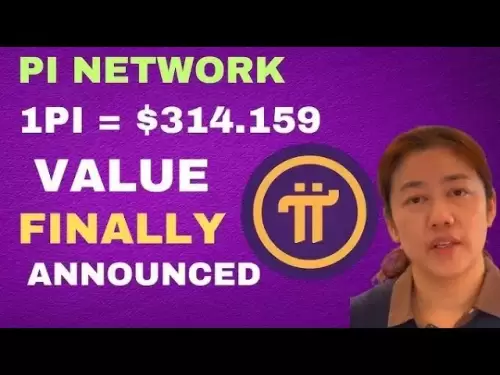-
 Bitcoin
Bitcoin $107,397.3430
-0.20% -
 Ethereum
Ethereum $2,467.5633
1.33% -
 Tether USDt
Tether USDt $1.0002
0.01% -
 XRP
XRP $2.1994
0.71% -
 BNB
BNB $655.8723
1.07% -
 Solana
Solana $157.3780
4.63% -
 USDC
USDC $1.0000
0.02% -
 TRON
TRON $0.2792
1.23% -
 Dogecoin
Dogecoin $0.1645
0.50% -
 Cardano
Cardano $0.5666
1.83% -
 Hyperliquid
Hyperliquid $39.8730
3.91% -
 Bitcoin Cash
Bitcoin Cash $514.7673
5.02% -
 Sui
Sui $2.7969
-0.51% -
 Chainlink
Chainlink $13.2880
0.07% -
 UNUS SED LEO
UNUS SED LEO $9.1148
-0.60% -
 Avalanche
Avalanche $17.9247
0.34% -
 Stellar
Stellar $0.2351
-0.98% -
 Toncoin
Toncoin $2.9456
2.69% -
 Shiba Inu
Shiba Inu $0.0...01144
-0.74% -
 Litecoin
Litecoin $85.9064
-0.62% -
 Hedera
Hedera $0.1495
1.47% -
 Monero
Monero $319.0339
3.82% -
 Polkadot
Polkadot $3.3940
-0.40% -
 Dai
Dai $1.0000
0.01% -
 Ethena USDe
Ethena USDe $1.0003
0.00% -
 Bitget Token
Bitget Token $4.5223
-1.95% -
 Uniswap
Uniswap $7.1384
-0.02% -
 Aave
Aave $272.7534
0.72% -
 Pepe
Pepe $0.0...09836
2.57% -
 Pi
Pi $0.5107
-2.06%
What cryptocurrencies does MEXC support for deposits and withdrawals?
MEXC supports a wide range of cryptocurrencies for deposits and withdrawals, including BTC, ETH, LTC, XRP, and more, ensuring a diverse portfolio management.
Apr 04, 2025 at 10:49 pm
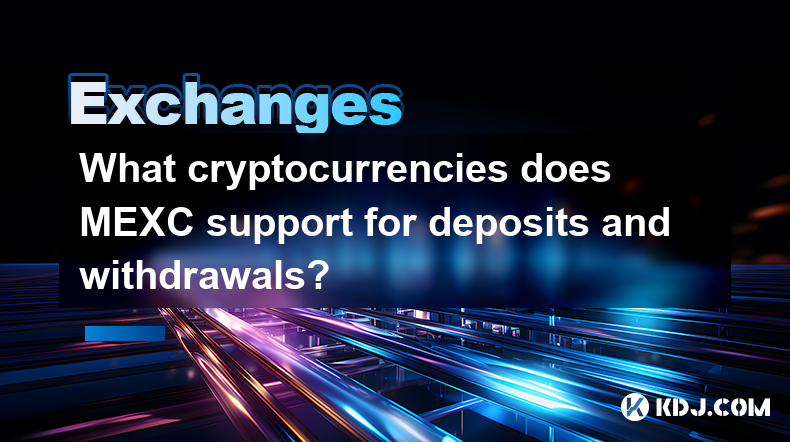
MEXC, one of the leading cryptocurrency exchanges, offers a wide range of cryptocurrencies for deposits and withdrawals. This article will delve into the specific cryptocurrencies supported by MEXC, providing detailed information on how to navigate the platform and manage your transactions effectively.
Understanding MEXC's Cryptocurrency Support
MEXC supports a vast array of cryptocurrencies, catering to both mainstream and niche markets. This extensive support ensures that users can easily manage a diverse portfolio. The platform's commitment to offering a broad selection of digital assets reflects its dedication to meeting the evolving needs of the crypto community.
Depositing Cryptocurrencies on MEXC
To deposit cryptocurrencies on MEXC, follow these steps:
- Log into your MEXC account. If you don't have an account, you'll need to create one.
- Navigate to the 'Wallet' section on the top menu bar.
- Select 'Deposit' from the options provided.
- Choose the cryptocurrency you wish to deposit. MEXC supports a wide range, including Bitcoin (BTC), Ethereum (ETH), Litecoin (LTC), Ripple (XRP), and many more.
- Copy the deposit address provided by MEXC. Ensure you use the correct address for the specific cryptocurrency you are depositing.
- Initiate the transfer from your external wallet to the MEXC deposit address. Be sure to include any required memo or tag if applicable.
- Wait for the transaction to be confirmed on the blockchain. Once confirmed, the funds will be credited to your MEXC account.
Withdrawing Cryptocurrencies from MEXC
Withdrawing cryptocurrencies from MEXC involves a similar process but in reverse. Here's how to do it:
- Log into your MEXC account.
- Go to the 'Wallet' section.
- Click on 'Withdraw'.
- Select the cryptocurrency you want to withdraw. MEXC supports withdrawals for many cryptocurrencies, such as Bitcoin Cash (BCH), Cardano (ADA), Stellar (XLM), and others.
- Enter the withdrawal address of the external wallet where you want to send the funds. Double-check the address to avoid errors.
- Specify the amount you wish to withdraw. Ensure you meet the minimum withdrawal amount for the selected cryptocurrency.
- Enter any required memo or tag if the cryptocurrency requires it.
- Review the transaction details and confirm the withdrawal. You may need to pass a security verification step.
- Wait for the transaction to be processed and confirmed on the blockchain. The time can vary depending on the cryptocurrency and network congestion.
Supported Cryptocurrencies for Deposits and Withdrawals
MEXC supports deposits and withdrawals for a comprehensive list of cryptocurrencies. Here are some of the notable ones:
- Bitcoin (BTC): The flagship cryptocurrency, widely used and supported on MEXC.
- Ethereum (ETH): The leading smart contract platform, with robust support for deposits and withdrawals.
- Litecoin (LTC): A popular alternative to Bitcoin, known for faster transaction times.
- Ripple (XRP): A cryptocurrency focused on enabling fast and low-cost international money transfers.
- Bitcoin Cash (BCH): A fork of Bitcoin, designed to improve scalability.
- Cardano (ADA): A blockchain platform focused on security and scalability.
- Stellar (XLM): A platform designed to facilitate cross-border payments.
- Tether (USDT): A stablecoin pegged to the US dollar, widely used for trading and as a store of value.
- Polkadot (DOT): A multi-chain platform that enables different blockchains to interoperate.
- Chainlink (LINK): A decentralized oracle network that connects smart contracts with real-world data.
This list is not exhaustive, and MEXC regularly updates its supported cryptocurrencies to include new and emerging digital assets.
Managing Your MEXC Wallet
Effective management of your MEXC wallet is crucial for a seamless experience. Here are some tips:
- Regularly check your wallet balance to ensure all deposits and withdrawals are processed correctly.
- Use the 'Transaction History' feature to track your deposits and withdrawals. This can help you monitor the status of your transactions and ensure they are completed as expected.
- Enable two-factor authentication (2FA) to add an extra layer of security to your account. This can help protect your funds from unauthorized access.
- Keep your withdrawal addresses saved in a secure location. This can streamline the withdrawal process and reduce the risk of errors.
Fees and Limits on MEXC
Understanding the fees and limits associated with deposits and withdrawals on MEXC is essential for managing your transactions effectively. Here's what you need to know:
- Deposit Fees: MEXC typically does not charge fees for deposits, but network fees may apply depending on the blockchain.
- Withdrawal Fees: MEXC charges a withdrawal fee for each cryptocurrency, which varies based on the asset and network conditions. These fees are used to cover the cost of processing the transaction on the blockchain.
- Withdrawal Limits: MEXC sets minimum and maximum withdrawal limits for each cryptocurrency. These limits can vary and are subject to change based on market conditions and platform policies.
Always check the current fees and limits on the MEXC platform before initiating a transaction to avoid surprises.
Frequently Asked Questions
Q: Can I deposit and withdraw any cryptocurrency on MEXC?
A: MEXC supports a wide range of cryptocurrencies for deposits and withdrawals, but not all cryptocurrencies are supported. Always check the list of supported assets on the MEXC platform before attempting to deposit or withdraw.
Q: How long does it take for a deposit or withdrawal to be processed on MEXC?
A: The processing time for deposits and withdrawals on MEXC can vary depending on the cryptocurrency and network conditions. Typically, deposits are credited to your account once they are confirmed on the blockchain, which can take anywhere from a few minutes to several hours. Withdrawals are processed by MEXC and then confirmed on the blockchain, which can take a similar amount of time.
Q: Are there any security measures I should take when depositing or withdrawing on MEXC?
A: Yes, it's important to take several security measures when managing your transactions on MEXC. Always use two-factor authentication (2FA) to secure your account. Double-check the deposit and withdrawal addresses to avoid sending funds to the wrong place. Additionally, keep your private keys and recovery phrases secure and never share them with anyone.
Q: Can I change my withdrawal address after initiating a transaction on MEXC?
A: No, once a withdrawal transaction is initiated on MEXC, you cannot change the withdrawal address. It's crucial to double-check the address before confirming the transaction to avoid sending funds to the wrong place.
Disclaimer:info@kdj.com
The information provided is not trading advice. kdj.com does not assume any responsibility for any investments made based on the information provided in this article. Cryptocurrencies are highly volatile and it is highly recommended that you invest with caution after thorough research!
If you believe that the content used on this website infringes your copyright, please contact us immediately (info@kdj.com) and we will delete it promptly.
- Unlock Crypto Riches: Mining Platforms & Starter Bonuses - Your Gateway to Digital Gold!
- 2025-06-30 22:30:11
- Dogecoin, Cloud Mining, and Risk Alerts: Navigating the Meme Minefield
- 2025-06-30 22:30:11
- Ric Edelman's Bold Crypto Allocation: A Financial Advisor's Perspective
- 2025-06-30 22:50:12
- Bitcoin Layer-2 Presale Heats Up: Is HYPER the Next Big Thing?
- 2025-06-30 22:50:12
- Bitcoin's Bull Run: Network Activity Tells a Different Story
- 2025-06-30 22:55:12
- SpacePay, Altcoins & Investing in 2025: What's the Buzz?
- 2025-06-30 23:10:12
Related knowledge
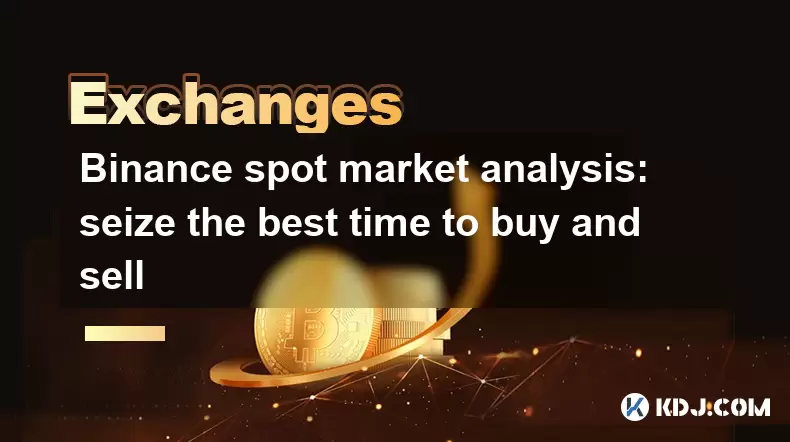
Binance spot market analysis: seize the best time to buy and sell
Jun 19,2025 at 04:56pm
Understanding the Binance Spot MarketThe Binance spot market is one of the most popular platforms for cryptocurrency trading globally. It allows users to trade digital assets at current market prices, making it essential for traders aiming to buy low and sell high. Unlike futures or margin trading, spot trading involves direct ownership of the asset aft...
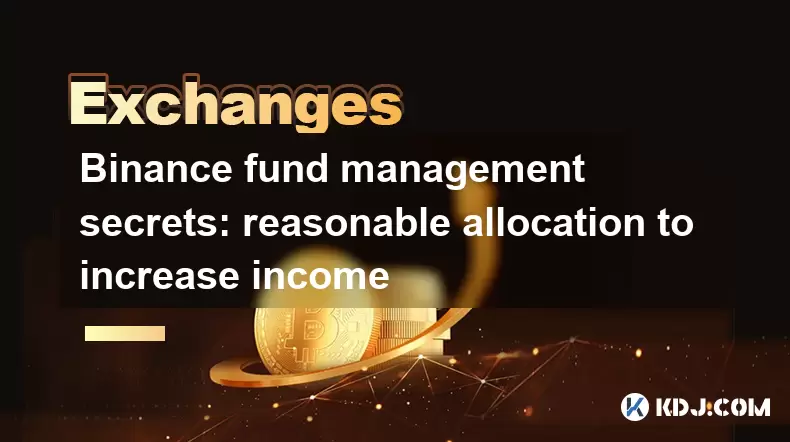
Binance fund management secrets: reasonable allocation to increase income
Jun 22,2025 at 02:29pm
Understanding Binance Fund ManagementBinance fund management involves strategic allocation of your cryptocurrency assets to optimize returns while managing risk. The key to successful fund management lies in understanding how different investment options on the Binance platform can be utilized to create a diversified portfolio. This includes spot tradin...

Binance trading pair selection skills: find the best buying and selling combination
Jun 23,2025 at 02:49am
Understanding the Basics of Trading Pairs on BinanceBefore diving into trading pair selection skills, it's essential to understand what a trading pair is. On Binance, a trading pair refers to two cryptocurrencies that can be traded against each other. For example, BTC/USDT means Bitcoin is being traded against Tether. Each trading pair has its own liqui...

Binance new coin mining strategy: participate in Launchpool to earn income
Jun 23,2025 at 11:56am
What is Binance Launchpool and how does it work?Binance Launchpool is a feature introduced by the world’s largest cryptocurrency exchange, Binance, to allow users to earn new tokens through staking. This platform enables users to stake their existing cryptocurrencies (such as BNB, BUSD, or other supported assets) in exchange for newly launched tokens. T...
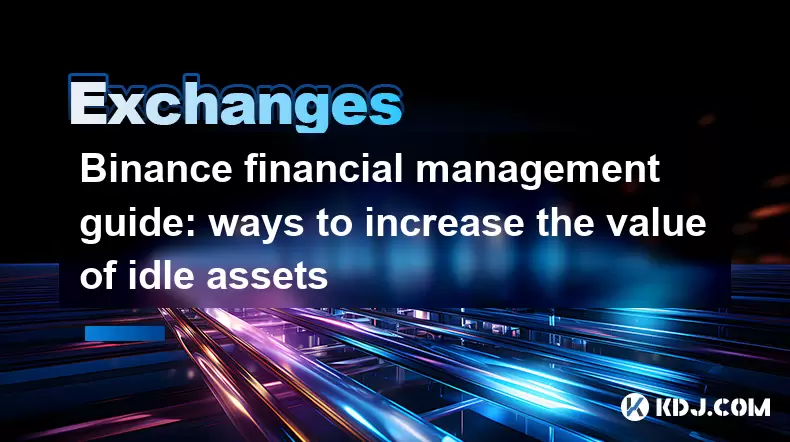
Binance financial management guide: ways to increase the value of idle assets
Jun 19,2025 at 11:22pm
Understanding Idle Assets in the Cryptocurrency SpaceIn the fast-paced world of cryptocurrency, idle assets refer to digital currencies that are not actively being used for trading, staking, or yield farming. Holding these funds in a wallet without utilizing them means missing out on potential growth opportunities. Binance, as one of the leading platfor...
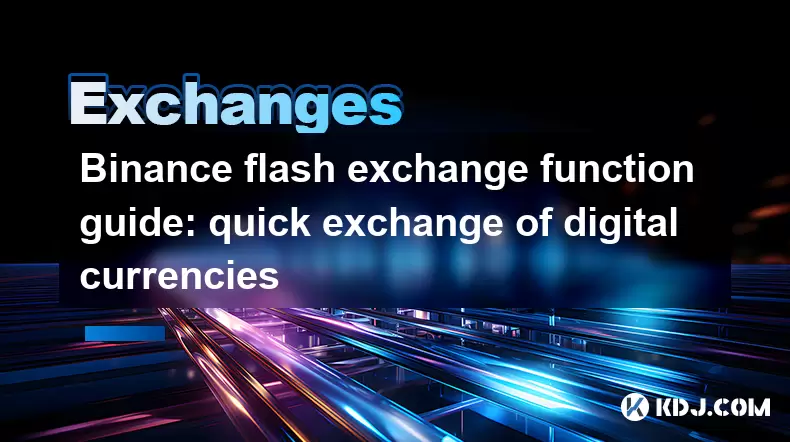
Binance flash exchange function guide: quick exchange of digital currencies
Jun 23,2025 at 12:29pm
What is the Binance Flash Exchange Function?The Binance Flash Exchange function is a powerful tool designed to allow users to instantly swap between supported cryptocurrencies without the need for placing traditional buy/sell orders. This feature simplifies the trading process by offering a direct exchange mechanism, eliminating the requirement to conve...

Binance spot market analysis: seize the best time to buy and sell
Jun 19,2025 at 04:56pm
Understanding the Binance Spot MarketThe Binance spot market is one of the most popular platforms for cryptocurrency trading globally. It allows users to trade digital assets at current market prices, making it essential for traders aiming to buy low and sell high. Unlike futures or margin trading, spot trading involves direct ownership of the asset aft...

Binance fund management secrets: reasonable allocation to increase income
Jun 22,2025 at 02:29pm
Understanding Binance Fund ManagementBinance fund management involves strategic allocation of your cryptocurrency assets to optimize returns while managing risk. The key to successful fund management lies in understanding how different investment options on the Binance platform can be utilized to create a diversified portfolio. This includes spot tradin...

Binance trading pair selection skills: find the best buying and selling combination
Jun 23,2025 at 02:49am
Understanding the Basics of Trading Pairs on BinanceBefore diving into trading pair selection skills, it's essential to understand what a trading pair is. On Binance, a trading pair refers to two cryptocurrencies that can be traded against each other. For example, BTC/USDT means Bitcoin is being traded against Tether. Each trading pair has its own liqui...

Binance new coin mining strategy: participate in Launchpool to earn income
Jun 23,2025 at 11:56am
What is Binance Launchpool and how does it work?Binance Launchpool is a feature introduced by the world’s largest cryptocurrency exchange, Binance, to allow users to earn new tokens through staking. This platform enables users to stake their existing cryptocurrencies (such as BNB, BUSD, or other supported assets) in exchange for newly launched tokens. T...

Binance financial management guide: ways to increase the value of idle assets
Jun 19,2025 at 11:22pm
Understanding Idle Assets in the Cryptocurrency SpaceIn the fast-paced world of cryptocurrency, idle assets refer to digital currencies that are not actively being used for trading, staking, or yield farming. Holding these funds in a wallet without utilizing them means missing out on potential growth opportunities. Binance, as one of the leading platfor...

Binance flash exchange function guide: quick exchange of digital currencies
Jun 23,2025 at 12:29pm
What is the Binance Flash Exchange Function?The Binance Flash Exchange function is a powerful tool designed to allow users to instantly swap between supported cryptocurrencies without the need for placing traditional buy/sell orders. This feature simplifies the trading process by offering a direct exchange mechanism, eliminating the requirement to conve...
See all articles


























